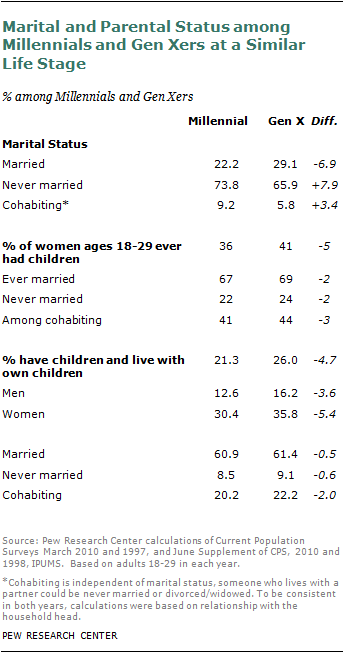
In 1960, the median age at first marriage in the U.S. was 23 for men and 21 for women; now it is 28 for men and 26 for women. The median age for first-time mothers in 1960 was 22; now it is 24.2
As the youngest generation of adults, today’s 18-29 year olds are continuing to push the frontiers of these behavioral changes. Indeed, a comparison between Millennials today and Gen Xers back when they were the age Millennnials are now shows that a significant degree of change has occurred just in the past decade and a half.
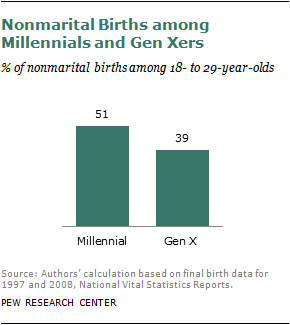
Only 22% of Millennials are currently married, compared with 29% of Gen Xers in 1997. In the meantime, cohabitation rate (that is, the share of adults who are living together without being married) among 18- to 29-year-olds has increased to 9.2% today, from 5.8% in 1997.3
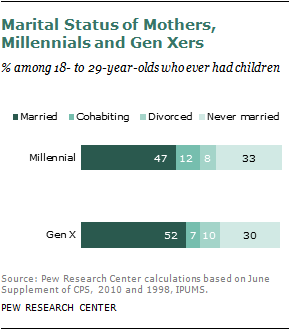
The incidence of parenthood among young adults has also declined. Just over a quarter of Gen Xers (26%) had children and were living with their children when they were 18 to 29 years old, compared with 21% of Millennials in 2010. Now, as then, there is a sharp gender difference on this measure.
Young men are much less likely than young women to live with their children. In 2010, about 30% of young women had children and lived with their children, compared with only about 13% of young men. The gender gap was similar in 1997, but both shares were higher.
At the same time, today’s young women are less likely to be mothers than were young women nearly a decade and a half ago. The share of women ages 18-29 who have ever had children has declined from 41% in 1998 to 36% in 2010; this decline has occurred regardless of the marital status of the young women.
Despite the drop of fertility rate among young adults, the share of nonmarital births has increased. Slightly more than half (51%) of the births among Millennials in 2008 were to unwed mothers. Looking back at Gen Xers about a decade ago in 1997, the rate of birth to unwed mothers was about four-in-ten (39%).
Consistent with these trends, young mothers today are more likely than those in the past to be unmarried. Fewer than half (47%) of Millennial mothers are currently married, about one-in-ten (12%) live with a partner and more than three-in-ten (33%) have never married. In 1998, when Gen Xers mothers were 18 to 29, 52% of them were married, 7% were cohabiting, and 30% had never married.
Family background
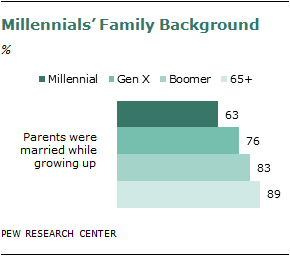
Millennials are less likely than their elders to have grown up in intact families. Asked about their parents’ marital status during most of their own childhood, about six-in-ten (63%) of Millennials say that their parents were married, while 20% say their parents were divorced and 12% say their parents were never married to each other. By contrast, 76% of Gen Xers, 83% of Boomers and 89% of Silent Generation adults say their parents were married most of the time they were growing up.
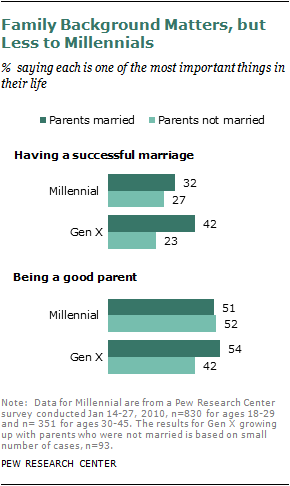
Does parental marital status affect one’s outlook on marriage and family? To the extent that there are correlations in the survey data, they are more pronounced among Gen Xers than among Millennials.
Among Gen Xers, more than four-in-ten (42%) of those whose parents were married say that having a successful marriage is one of the most important things in life, compared with only 23% of Gen Xers whose parents were not married while they growing up. The gap is 19 percentage points. However, parents’ marital status is not strongly correlated with Millennials’ views on marriage. For them, the gap is only 5 percentage points. Some 27% of Millennials whose parents were unmarried and 32% of those whose parents were married say having a successful marriage is one of the most important things in their life.
Similarly, about half of Millennials say that being a good parent is one of the most important things in life—and this is the case regardless of their parents’ marital status. But for Gen Xers, 54% of those whose parents were married while they were growing up say that being a good parent is one of the most important things in their life, compared with 42% of those with unmarried parents while growing up.




